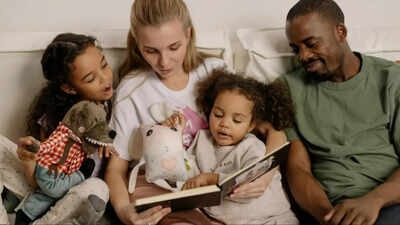ARTICLE AD BOX

Here are 6 bedtime stories parents should tell kids to make them smarter (Image: Pexels)
Bedtime stories have always been a cherished ritual between parents and children but beyond creating warm memories, storytelling plays a critical role in building kids language, imagination, empathy and even cognitive skills.
They are tools for raising emotionally intelligent, imaginative and academically strong children. From fairy tales to family sagas, each type of story strengthens different cognitive and emotional muscles. Storytelling literally shapes a child’s brain. Parents who turn bedtime into a storytelling classroom are not just putting kids to sleep, they are preparing them to wake up smarter, kinder and more resilient.A 2014 study published in the Journal of Developmental & Behavioral Pediatrics shared that children whose parents regularly read or narrated stories had stronger vocabulary and higher literacy skills by kindergarten. Similarly, neuroscientists at Cincinnati Children’s Hospital shared in a 2015 study in Pediatrics that listening to stories activates brain regions responsible for visual imagery, narrative comprehension and word meaning.
This evidence suggests that bedtime stories do more than entertain; they literally help children grow smarter.

Say goodbye to bedtime battles: Here's the sleep routine that works like magic (Image: TOI)
Here are six types of bedtime stories parents can tell to sharpen their child’s mind while keeping the magic of nighttime storytelling alive.
Classic fairy tales (for imagination and morality)
Fairy tales like Cinderella or Hansel and Gretel build narrative understanding and moral reasoning. They expand imagination while teaching children about right, wrong and consequences. A 2015 study in Early Childhood Research Quarterly found that children exposed to traditional storytelling developed stronger narrative skills and better understanding of social norms.
Fables with life lessons (for critical thinking)
Aesop’s Fables or Panchatantra tales distil complex ideas into simple, memorable lessons. Moral-driven stories build reasoning skills and teach children to connect actions with outcomes. Storytelling with moral lessons helped children apply abstract thinking to real-life problems.
Family history stories (for identity and resilience)
Sharing stories of grandparents or family struggles gives children a sense of belonging and resilience. Family narratives anchor children, boosting emotional intelligence and adaptability. A 2008 study in Memory found that children who knew their family history had higher self-esteem and better coping skills during stress.
Science-inspired stories (for curiosity and STEM skills)
Simple stories about stars, animals, or inventions spark curiosity about the natural world. Science stories foster curiosity, logical thinking and a love for exploration. A 2010 study in Science Education reported that early science storytelling improved children’s scientific literacy and inquiry skills later in school.
Cultural myths and epics (for cultural intelligence and creativity)
Tales from epics like the Mahabharata, Ramayana or Greek mythology expose children to diverse cultural values and problem-solving. Cultural myths broaden horizons and enhance creative reasoning. A 2004 study in Journal of Applied Cognitive Psychology established that exposure to culturally rich stories improved perspective-taking and imaginative problem-solving.
Original made-up stories (for creativity and bonding)
When parents invent stories on the spot, children engage actively, sometimes even co-creating narratives. Made-up stories not only flex creativity but also deepen the parent-child bond. A 2006 study in Cognitive Development highlighted that imaginative storytelling supports causal reasoning and creative problem-solving.



.png)
.png)
.png)
















 3 days ago
3
3 days ago
3







 English (US) ·
English (US) ·